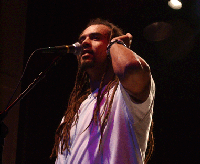|
Taken from The Cavalier Daily (March 02, 2004)
Michael Franti talks music, inspiration
Interview with lead singer of reggae group Spearhead speaks about musical influences, Rasta culture, future plans
by Mariko Fritz-krockow
Cavalier Daily Editor

Artists Ziggy Marley and Michael Franti performed at James Madison University last Monday. Both gave interviews with Cavalier Daily editor Mariko Fritz-Krockow. |
The lights dimmed as Michael Franti and Ziggy Marley took the stage at James Madison University last Monday. Hundreds of students with non-dilating eyes looked up at them with awe and disbelief as they screamed their welcomes. As I stood there, one of the only non-high people in attendance, a feeling of pure joy came over me as I remembered the interviews that myself and two other press members had had with them only two hours earlier.
Michael Franti, the lead singer of Spearhead, spoke with me first. He walked into the room and around the conference room table and gave everyone hugs. The room was immediately filled with a warm, "one-love" attitude. I just had to love him instantly.
Throughout the session he joked with his and our crew and made a point of remembering everyone's name, which in my case is an unusual occurrence. After meeting this man, you want to be his friend.
Cavalier Daily: How would you describe your music?
Michael Franti: Somebody, I don't know who it was, said that talking about music is like dancing about poetry. You can't really describe it. My music is about emotions, you know? I try to find some truth, whether it's a hidden truth or a spiritual truth, a sexual truth or a political truth, and from there I kind of describe that truth.
CD: When did you decide you wanted to be a musician?
MF: When I was growing up as a kid, I grew up in a family with five children, and everybody played an instrument except me. I played basketball. I took one piano lesson, and I quit. ... It's just so frustrating. But when I got into University of San Francisco, I got a scholarship to play basketball there. When I was there, my first year, I was in the same building as the college radio station. I went there every day.
CD: You said [earlier] that you were influenced by different types of music. What kind of music would that be?
MF: Well, at the time [I went to school in 1984], it was a very emerging time for hip-hop, punk rock, REM, other more underground rock, but not in the hard rock style. And reggae. And so those were the combinations of music that really touched me.
CD: If you had one thing you could teach the whole world, what would it be?
MF: I don't know. I don't think I could really teach them anything, you know? I would have the desire that everyone has an ease of heart. Right now, we are living in a really painful time. Just sitting around discussing the news of the day, there is so much turmoil and confusion in the world right now, and it's really hard just to get up in the morning and face the day. I wish people ease of heart. Whatever it is that they are feeling inside, it is ready to pass. If they need to cry, you cry. And if you need to laugh, laugh, you know? It's kind of what I try to do with my music, too. I deal with stuff that is political, but sometimes my songs are just about inspiration and determination.
CD: How did you get exposed to the Rasta culture?
MF: Through music. I'm not a Rastafarian, but our tour manager is and Ziggy [Marley] is. There is a lot in the Rastafarian beliefs that I think are really important ideals, you know? Like the idea of shared community, and the idea of one love, that we are not just individuals, but one body of human beings and are connected to the natural world.
CD: So you accept the beliefs of the Rastafarian beliefs, but you are not Rasta?
MF: Well, I look at it this way­--my religion is "kindness."
CD: That's what the Buddhists say!
MF: Yes (laughs). But I'm not Buddhist. I just believe in practicing love and kindness.
CD: Do you think you sacrifice a lot for your music?
MF: Yeah, I think the biggest sacrifice for me has been time. Family is certainly one of the things. ... It's hard being on the road. But I always knew from the beginning I wanted to make music that my family and children could be proud of.
CD: Any big near-future or future plans?
MF: Well, we are continuing with Ziggy for the next month, and then we go to Australia for about a week. Ziggy is going to Brazil, and so we might go there with him. We are working on a new album, and in the summer we are going to Europe.
CD: Thank you so much!
MF: Thanks a lot, thank you.
|